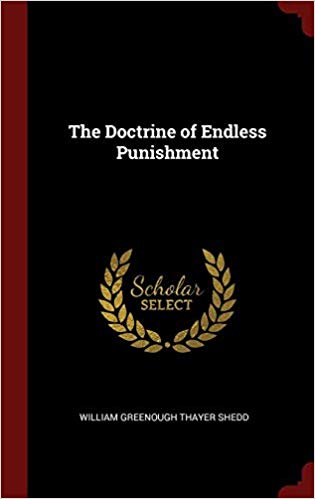A Brief Book Summary from Books At a Glance
By Mitch Chase
About the Author
William G. T. Shedd was an American theologian in the 1800s. In addition to a stint in pastoral ministry, Shedd was a professor at several schools and taught a variety of subjects, such as church history, literature, and systematic theology. He authored numerous books, including Lectures on the Philosophy of History and Sermons to the Spiritual Man.
Overview
The doctrine of endless punishment of the wicked has been a position rightly held and defended throughout church history. While the doctrine has had its detractors for sure, objections have had little exegetical basis and have relied much more on emotional appeals and rejections. But when the fullness of God’s word is considered on the notion of eternal punishment, the Old and New Testaments both uphold it. The Old Testament speaks of Sheol and the New Testament of Hades as the place where the wicked will go under God’s eternal condemnation. Jesus himself speaks about the eternal judgment of hell, and it is the place where Satan will be tormented day and night forever. If readers will consider the nature of sin, the holiness of God, and need for justice, a rational case for endless punishment can be made. The doctrine of endless punishment has misunderstandings that must be corrected as well, such as the belief that most of humanity will be eternally lost, or that people in hell may desire worship and repentance after they have died, or that a third location—known as purgatory—may prevent people from descending into hell, or that Jesus himself descended into hell between his death and resurrection. Once the biblical text and sound reason are consulted, the truthfulness of endless punishment will be clearer, and the need to trust in God’s Son as the penal substitute for sinners will be more urgent.
Table of Contents
Preface
1 The History of the Doctrine
2 The Biblical Argument
3 The Rational Argument
Summary
Chapter 1: The History of the Doctrine
The ancient church believed in the eternal punishment of the wicked. Occasional deviation from that conviction did occur, but less so than even trinitarian deviations. The future and eternal punishment of the wicked was so predominantly held that no council was ever required in order to establish a lengthy conclusion on the subject.
Origen emphasized the liberty of man’s will. Free will could rebel at any point, and it could turn to God at any point too. An implication of Origen’s view was an unending series of falls and recoveries. Augustine rejected and refuted Origen’s view since it held out the possibility of the wicked being eschatologically restored rather than facing endless retribution. Origen’s influence, however, was seen in figures like Didymus of Alexandria, the two Gregorys, and Theodore of Mopsuestia. The Medieval Church held to the doctrine of endless punishment, and Reformation churches cohered with this position as well.
Universalism, a view which means the wicked will not suffer endlessly in hell but rather will be saved, took root in German theology and grew in association with pantheism and rationalism in Germany. A representative of this era in Germany is Schleiermacher, who taught that Jesus’ words about final judgment and endless punishment were figurative. Eventually, he argued, the wicked would become remorseful. And the saved of heaven would not be able to increase in their own happiness with the awareness of the wicked being punished endlessly in hell.
Some theologians, like Julius Muller, believed people can receive forgiveness in this life or in the life to come. Others like Rothe teach that the unrepentant will be finally annihilated, and thus there is no endless retribution. Dorner professes agnosticism on the question, unsure whether everyone in the end will receive the blessing of eternal life.
[To continue reading this summary, please see below....]The remainder of this article is premium content. Become a member to continue reading.
Already have an account? Sign In
